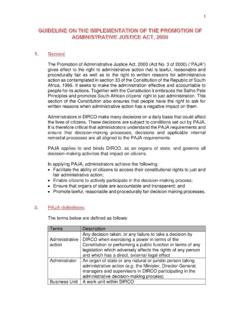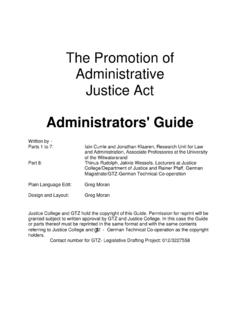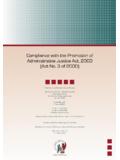Transcription of PROMOTION OF ADMINISTRATIVE JUSTICE ACT 3 OF 2000
1 PROMOTION OF ADMINISTRATIVE JUSTICE ACT 3 OF 2000 [ASSENTED TO 3 FEBRUARY 2000] [DATE OF COMMENCEMENT: 30 NOVEMBER 2000] (Unless otherwise indicated) (English text signed by the President) as amended by Judicial Matters Amendment Act 42 of 2001 PROMOTION of ADMINISTRATIVE JUSTICE Amendment Act 53 of 2002 Judicial Matters Second Amendment Act 55 of 2003 Judicial Matters Amendment Act 22 of 2005 Public Service Amendment Act 30 of 2007 Judicial Matters Amendment Act 66 of 2008 Regulations under this Act REGULATIONS ON FAIR ADMINISTRATIVE PROCEDURES (GN R1022 in GG 23674 of 31 July 2002) ACT To give effect to the right to ADMINISTRATIVE action that is lawful, reasonable and procedurally fair and to the right to written reasons for ADMINISTRATIVE action as contemplated in section 33 of the Constitution of the Republic of South Africa, 1996; and to provide for matters incidental thereto.
2 Preamble WHEREAS section 33 (1) and (2) of the Constitution provides that everyone has the right to ADMINISTRATIVE action that is lawful, reasonable and procedurally fair and that everyone whose rights have been adversely affected by ADMINISTRATIVE action has the right to be given written reasons; AND WHEREAS section 33 (3) of the Constitution requires national legislation to be enacted to give effect to those rights, and to- * provide for the review of ADMINISTRATIVE action by a court or, where appropriate, an independent and impartial tribunal; * impose a duty on the state to give effect to those rights; and * promote an efficient administration; AND WHEREAS item 23 of Schedule 6 to the Constitution provides that the national legislation envisaged in section 33 (3) must be enacted within three years of the date on which the Constitution took effect; AND IN ORDER TO- * promote an efficient administration and good governance.
3 And * create a culture of accountability, openness and transparency in the public administration or in the exercise of a public power or the performance of a public function, by giving effect to the right to just ADMINISTRATIVE action, BE IT THEREFORE ENACTED by the Parliament of the Republic of South Africa, as follows:- Page 1 of 13 PROMOTION OF ADMINISTRATIVE JUSTICE ACT 3 OF 200012/7/2009http://juta/ Definitions In this Act, unless the context indicates otherwise- ' ADMINISTRATIVE action' means any decision taken, or any failure to take a decision, by- (a) an organ of state, when- (i) exercising a power in terms of the Constitution or a provincial constitution; or (ii) exercising a public power or performing a public function in terms of any legislation; or (b) a natural or juristic person, other than an organ of state, when exercising a public power or performing a public function in terms of an empowering provision, which adversely affects the rights of any person and which has a direct, external legal effect, but does not include- (aa) the executive powers or functions of the National Executive, including the powers or functions referred to in sections 79 (1) and (4), 84 (2) (a) , (b) , (c) , (d) , (f) , (g) , (h) , (i) and (k) , 85 (2) (b) , (c) , (d) and (e) , 91 (2), (3), (4) and (5), 92 (3), 93, 97, 98, 99 and 100 of the Constitution.
4 (bb) the executive powers or functions of the Provincial Executive, including the powers or functions referred to in sections 121 (1) and (2), 125 (2) (d) , (e) and (f) , 126, 127 (2), 132 (2), 133 (3) (b) , 137, 138, 139 and 145 (1) of the Constitution; (cc) the executive powers or functions of a municipal council; (dd) the legislative functions of Parliament, a provincial legislature or a municipal council; (ee) the judicial functions of a judicial officer of a court referred to in section 166 of the Constitution or of a Special Tribunal established under section 2 of the Special Investigating Units and Special Tribunals Act, 1996 ( Act 74 of 1996 ), and the judicial functions of a traditional leader under customary law or any other law; (ff) a decision to institute or continue a prosecution; (gg) a decision relating to any aspect regarding the nomination, selection or appointment of a judicial officer or any other person, by the Judicial Service Commission in terms of any law; [Para.]
5 (gg) substituted by s. 26 of Act 55 of 2003.] (hh) any decision taken, or failure to take a decision, in terms of any provision of the PROMOTION of Access to Information Act, 2000; or (ii) any decision taken, or failure to take a decision, in terms of section 4 (1); 'administrator' means an organ of state or any natural or juristic person taking ADMINISTRATIVE action; 'Constitution' means the Constitution of the Republic of South Africa, 1996; Page 2 of 13 PROMOTION OF ADMINISTRATIVE JUSTICE ACT 3 OF 200012/7/2009http://juta/ 'court' means- (a) the Constitutional Court acting in terms of section 167 (6) (a) of the Constitution; or (b) (i) a High Court or another court of similar status; or (ii) a Magistrate's Court, either generally or in respect of a specified class of ADMINISTRATIVE actions, designated by the Minister by notice in the Gazette and presided over by a magistrate or an additional magistrate designated in terms of section 9A, within whose area of jurisdiction the ADMINISTRATIVE action occurred or the administrator has his or her or its principal place of administration or the party whose rights have been affected is domiciled or ordinarily resident or the adverse effect of the ADMINISTRATIVE action was, is or will be experienced; [Definition of 'court' substituted by s.
6 1 of Act 53 of 2002.] 'decision' means any decision of an ADMINISTRATIVE nature made, proposed to be made, or required to be made, as the case may be, under an empowering provision, including a decision relating to- (a) making, suspending, revoking or refusing to make an order, award or determination; (b) giving, suspending, revoking or refusing to give a certificate, direction, approval, consent or permission; (c) issuing, suspending, revoking or refusing to issue a licence, authority or other instrument; (d) imposing a condition or restriction; (e) making a declaration, demand or requirement; (f) retaining, or refusing to deliver up, an article; or (g) doing or refusing to do any other act or thing of an ADMINISTRATIVE nature, and a reference to a failure to take a decision must be construed accordingly; 'empowering provision' means a law, a rule of common law, customary law, or an agreement, instrument or other document in terms of which an ADMINISTRATIVE action was purportedly taken; 'failure' , in relation to the taking of a decision, includes a refusal to take the decision; 'Minister' means the Cabinet member responsible for the administration of JUSTICE ; 'organ of state' bears the meaning assigned to it in section 239 of the Constitution; 'prescribed' means prescribed by regulation made under section 10; 'public' , for the purposes of section 4, includes any group or class of the public; 'this Act' includes the regulations.
7 And 'tribunal' means any independent and impartial tribunal established by national legislation for the purpose of judicially reviewing an ADMINISTRATIVE action in terms of this Page 3 of 13 PROMOTION OF ADMINISTRATIVE JUSTICE ACT 3 OF 200012/7/2009http://juta/ 2 Application of Act (1) The Minister may, by notice in the Gazette - (a) if it is reasonable and justifiable in the circumstances, exempt an ADMINISTRATIVE action or a group or class of ADMINISTRATIVE actions from the application of any of the provisions of section 3, 4 or 5; or (b) in order to promote an efficient administration and if it is reasonable and justifiable in the circumstances, permit an administrator to vary any of the requirements referred to in section 3 (2), 4 (1) (a) to (e) , (2) and (3) or 5 (2), in a manner specified in the notice.
8 (2) Any exemption or permission granted in terms of subsection (1) must, before publication in the Gazette , be approved by Parliament. 3 Procedurally fair ADMINISTRATIVE action affecting any person (1) ADMINISTRATIVE action which materially and adversely affects the rights or legitimate expectations of any person must be procedurally fair. (2) (a) A fair ADMINISTRATIVE procedure depends on the circumstances of each case. (b) In order to give effect to the right to procedurally fair ADMINISTRATIVE action, an administrator, subject to subsection (4), must give a person referred to in subsection (1)- (i) adequate notice of the nature and purpose of the proposed ADMINISTRATIVE action; [Sub-para. (i), previously para. (a) , renumbered by s. 46 of Act 42 of 2001.] (ii) a reasonable opportunity to make representations; [Sub-para.]
9 (ii), previously para. (b) , renumbered by s. 46 of Act 42 of 2001.] (iii) a clear statement of the ADMINISTRATIVE action; [Sub-para. (iii), previously para. (c) , renumbered by s. 46 of Act 42 of 2001.] (iv) adequate notice of any right of review or internal appeal, where applicable; and [Sub-para. (iv), previously para. (d) , renumbered by s. 46 of Act 42 of 2001.] (v) adequate notice of the right to request reasons in terms of section 5. [Sub-para. (v), previously para. (e) , renumbered by s. 46 of Act 42 of 2001.] (3) In order to give effect to the right to procedurally fair ADMINISTRATIVE action, an administrator may, in his or her or its discretion, also give a person referred to in subsection (1) an opportunity to- (a) obtain assistance and, in serious or complex cases, legal representation; (b) present and dispute information and arguments; and (c) appear in person.
10 (4) (a) If it is reasonable and justifiable in the circumstances, an administrator may depart from any of the requirements referred to in subsection (2). Page 4 of 13 PROMOTION OF ADMINISTRATIVE JUSTICE ACT 3 OF 200012/7/2009http://juta/ (b) In determining whether a departure as contemplated in paragraph (a) is reasonable and justifiable, an administrator must take into account all relevant factors, including- (i) the objects of the empowering provision; (ii) the nature and purpose of, and the need to take, the ADMINISTRATIVE action; (iii) the likely effect of the ADMINISTRATIVE action; (iv) the urgency of taking the ADMINISTRATIVE action or the urgency of the matter; and (v) the need to promote an efficient administration and good governance. (5) Where an administrator is empowered by any empowering provision to follow a procedure which is fair but different from the provisions of subsection (2), the administrator may act in accordance with that different procedure.













![Promotion of Administrative Justice Act [No. 3 of 2000]](/cache/preview/d/2/b/1/9/3/e/0/thumb-d2b193e068cd6514a9f01ca11404fbca.jpg)
